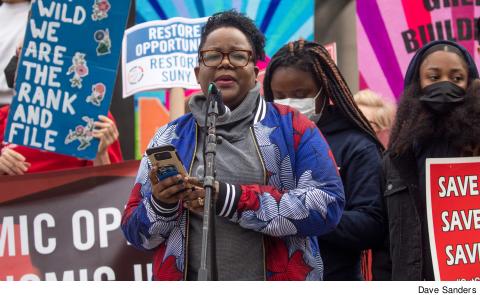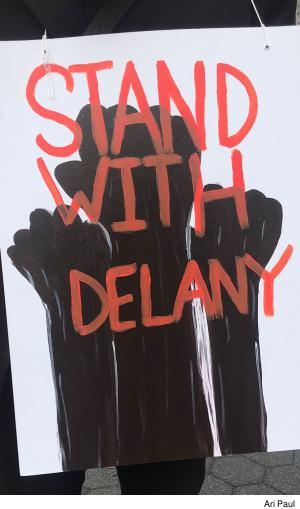Members see no ‘real’ solutions
 |
The union has filed a grievance alleging that the Queens College (QC) administration’s failure to properly investigate a racist and antisemitic incident on campus in January constitutes a violation of the contract’s nondiscrimination language. As Clarion first reported in the February 2022 issue, on January 6, a swastika and the words “KKK LIVES” were found carved onto a public bulletin board at QC’s Delany Hall, which is home to the Africana studies department, the higher education access program SEEK (Search for Education, Elevation and Knowledge) and the Center for Ethnic, Racial and Religious Understanding (CERRU). The building itself is the first building on the campus to be named after a Black faculty member, a result of activism by Black, Jewish and Puerto Rican students, faculty and staff who pushed for a campus building to house programs that serve primarily BIPOC communities.
NOT RANDOM
The attack at Queens College, a campus where PSC members have complained about various racist, Islamophobic and antisemitic incidents in the past, was not considered random. The graffiti was discovered on the first anniversary of the Capitol Hill insurrection, which involved vari ous far-right groups. Around the same time as the Delany incident, several historically Black colleges and universities experienced bomb threats, including at Morgan State University in Baltimore and Howard University in Washington, DC, as well as at CUNY’s Borough of Manhattan Community College.
 |
On February 22, a group of PSC members who work at Delany sent a letter to QC President Frank Wu, demanding, as the chapter put it in a statement, “facilitation for addressing racial trauma, [action] following the guidance and recommendations of Delany community leaders; a detailed timeline for the investigation of the January 6 incident and [an] explanation of steps taken; human rights training for public safety personnel and enhanced protective measures at Delany, including improved lighting, panic buttons and swipe card entry; [and] a committee to develop an actionable zero-tolerance policy with oversight from a collective that includes minoritized students, faculty and staff.” Wu responded in an email the next day (QC administration had issued several general emails to the Delany community since the incident). The PSC QC Chapter believes the administration’s actions in response to the incident have been insufficient. There are 40 faculty and staff members working in the building, and as of this writing, only two have been interviewed about the incident, according to PSC QC Chapter Chair David Gerwin. The college also failed to interview a faculty member who received a death threat by phone, and President Wu has postponed two scheduled visits to Delany, Gerwin noted.
UNHEARD CONCERNS
Norka Blackman-Richards, director of the college’s SEEK Program, said that the workers based in Delany Hall have seen “no satisfactory solutions” from the administration. She added, “We feel gaslighted and unheard.”
The PSC grievance filed on behalf of all faculty and staff working in Delany alleges that the administration violated Article 8 of the PSC-CUNY contract, which protects members from racial discrimination, as well as violated CUNY’s own policies on workplace violence. The grievance cites an “improper investigation of and response to public safety complaints,” and demands that the administration implement an “immediate and thorough investigation and report to the affected employees and all other[s] [to] make whole relief.”
FEELING UNSAFE
“There’s no reason for several iterations of letters from the president’ office,” said Soribel Genao, an associate professor in the department of educational and community programs at Queens College. “We didn’t get the attention we needed. There is now a lack of safety. In our department, we have asked our secretaries about how they feel, because they are women of color. [The administration should] at least be mindful about how we feel as Black and brown people. There should have been more empathy.”
The union chapter noted that there is no evidence of a police report being filed in response to the incident. “Why not show us the report?” asked Genao. “What happened [at] Queens College and Delany Hall is not only a Queens issue,” said Lawrence Johnson, a cochair of the union’s Anti-Racism Committee. “Generally speaking, reports of harassment of students, staff and faculty are actually quite normal. What makes the incident at Queens distinct is that [members] have been effective at bringing attention to it in ways that victims of such incidents are often too beleaguered to do, especially staff members who fear retaliation from their superiors.”
Johnson, an assistant professor of sociology at Brooklyn College, said that the incident should inspire the “development of a CUNY Central anti-racist response team, composed of faculty, staff and students so that these situations are not isolated and institutional responses are therefore not limited to the judgment of individual administrators.”
Johnson said that both the Queens College and CUNY Central administrations’ lackluster response to the incident was evidence that there must be an ongoing, CUNY-wide anti-racist taskforce. He suggested that there be “annual meetings between anti-racist leaders on campus, administration and PSC leaders to discuss and plan ongoing initiatives, strategies and implementation to create a safer environment for all the CUNY community.”
For Gerwin, a professor of secondary education and youth services at the college, the perceived half-heartedness of the administration’s investigation isn’t just a contractual issue, but a sign that President Frank Wu is out of touch with faculty, staff and students on his campus. “What he thinks is happening in his mind and what’s happening on the ground are completely different,” Gerwin said. “He doesn’t have any sense of what’s happening.”

